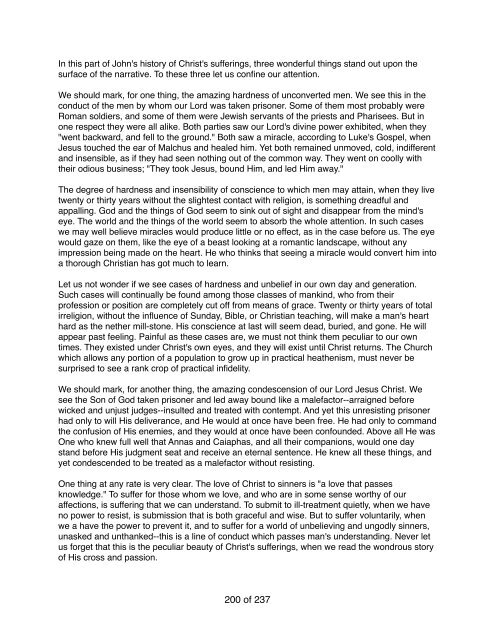J. C. Ryle John
John Charles Ryle (May 10, 1816 - June 10, 1900) was an evangelical Anglican clergyman and first Bishop of Liverpool. He was renowned for his powerful preaching and extensive tracts.
John Charles Ryle (May 10, 1816 - June 10, 1900) was an evangelical Anglican clergyman and first Bishop of Liverpool. He was renowned for his powerful preaching and extensive tracts.
Create successful ePaper yourself
Turn your PDF publications into a flip-book with our unique Google optimized e-Paper software.
In this part of <strong>John</strong>'s history of Christ's sufferings, three wonderful things stand out upon the<br />
surface of the narrative. To these three let us confine our attention.<br />
We should mark, for one thing, the amazing hardness of unconverted men. We see this in the<br />
conduct of the men by whom our Lord was taken prisoner. Some of them most probably were<br />
Roman soldiers, and some of them were Jewish servants of the priests and Pharisees. But in<br />
one respect they were all alike. Both parties saw our Lord's divine power exhibited, when they<br />
"went backward, and fell to the ground." Both saw a miracle, according to Luke's Gospel, when<br />
Jesus touched the ear of Malchus and healed him. Yet both remained unmoved, cold, indifferent<br />
and insensible, as if they had seen nothing out of the common way. They went on coolly with<br />
their odious business; "They took Jesus, bound Him, and led Him away."<br />
The degree of hardness and insensibility of conscience to which men may attain, when they live<br />
twenty or thirty years without the slightest contact with religion, is something dreadful and<br />
appalling. God and the things of God seem to sink out of sight and disappear from the mind's<br />
eye. The world and the things of the world seem to absorb the whole attention. In such cases<br />
we may well believe miracles would produce little or no effect, as in the case before us. The eye<br />
would gaze on them, like the eye of a beast looking at a romantic landscape, without any<br />
impression being made on the heart. He who thinks that seeing a miracle would convert him into<br />
a thorough Christian has got much to learn.<br />
Let us not wonder if we see cases of hardness and unbelief in our own day and generation.<br />
Such cases will continually be found among those classes of mankind, who from their<br />
profession or position are completely cut off from means of grace. Twenty or thirty years of total<br />
irreligion, without the influence of Sunday, Bible, or Christian teaching, will make a man's heart<br />
hard as the nether mill-stone. His conscience at last will seem dead, buried, and gone. He will<br />
appear past feeling. Painful as these cases are, we must not think them peculiar to our own<br />
times. They existed under Christ's own eyes, and they will exist until Christ returns. The Church<br />
which allows any portion of a population to grow up in practical heathenism, must never be<br />
surprised to see a rank crop of practical infidelity.<br />
We should mark, for another thing, the amazing condescension of our Lord Jesus Christ. We<br />
see the Son of God taken prisoner and led away bound like a malefactor--arraigned before<br />
wicked and unjust judges--insulted and treated with contempt. And yet this unresisting prisoner<br />
had only to will His deliverance, and He would at once have been free. He had only to command<br />
the confusion of His enemies, and they would at once have been confounded. Above all He was<br />
One who knew full well that Annas and Caiaphas, and all their companions, would one day<br />
stand before His judgment seat and receive an eternal sentence. He knew all these things, and<br />
yet condescended to be treated as a malefactor without resisting.<br />
One thing at any rate is very clear. The love of Christ to sinners is "a love that passes<br />
knowledge." To suffer for those whom we love, and who are in some sense worthy of our<br />
affections, is suffering that we can understand. To submit to ill-treatment quietly, when we have<br />
no power to resist, is submission that is both graceful and wise. But to suffer voluntarily, when<br />
we a have the power to prevent it, and to suffer for a world of unbelieving and ungodly sinners,<br />
unasked and unthanked--this is a line of conduct which passes man's understanding. Never let<br />
us forget that this is the peculiar beauty of Christ's sufferings, when we read the wondrous story<br />
of His cross and passion.<br />
200 of 237




